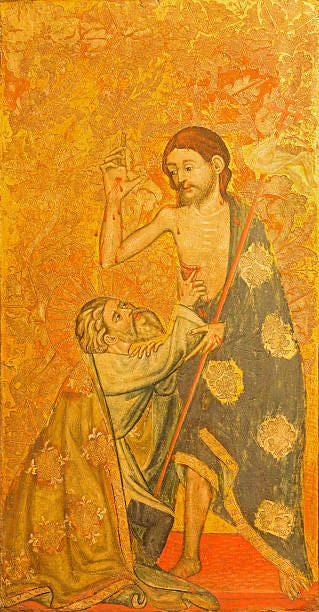Let us hear the Holy Gospel!
Peace be unto all!
“Now Thomas (also known as Didymus, one of the Twelve), was not with the disciples when Jesus came. So the other disciples told him, “We have seen the Lord!” But he said to them, “Unless I see the nail marks in his hands and put my finger where the nails were, and put my hand into his side, I will not believe.”
A week later his disciples were in the house again, and Thomas was with them. Though the doors were locked, Jesus came and stood among them and said, “Peace be with you!” Then he said to Thomas, “Put your finger here; see my hands. Reach out your hand and put it into my side. Stop doubting and believe.” The Gospel of John, 20:24-27 (NIV)
They locked the doors. Christ was “out there”.
What doors have you closed? Why have you locked yourself off from Christ?
Disbelief in the witness of His disciples? “We have seen the risen Lord!”
Lack of a personal encounter, a miraculous experience of God? Or perhaps even just an ordinary, impersonal one….
Perhaps your world view and personal philosophy cannot explain or encompass someone so wild and mystifying.
Maybe you missed an opportunity to be in a place where Christ appeared to other people?
Perhaps you died before encountering the transforming holy fire of the love of God.
What is the eternal disposition of the doubters, the faithless, the ignorant, the prudent skeptics?
We say “the theology of the church is in its hymnography”.
Listen to the hymnography of the Orthodox Church from the services of Thomas Sunday:
“Thomas, called the Twin, was not with the Disciples, O Christ,
when You came to them through closed doors.
Therefore he doubted their word.
You did not reject him for his faithlessness.
When he saw Your side and the wounds in Your hands and feet,
his faith was made certain.
Having touched and seen,
he confessed You to be truly God, not only man,
crying: “My Lord and my God, glory to You!”
(From the Verses and Stichera of Vespers)
Within the closed doors, Christ appears. He is not knocking on the doors waiting for us to open them. He is not eternally securing the doors from the outside so we will never see him nor ever escape from our small rooms of disbelief. He appears within our closed doors.
“You did not reject him for his faithlessness”.
Instead of rejecting us, He appears in the midst of what separates us from God: Just as he did ten days before, entering the depths of Hades and bringing the Gospel of eternal life to those held captive behind the closed doors of eternal death.
The Church sings:
O most glorious wonder!
Thomas placed his hand on the fiery side of Jesus Christ our God!
He was not scorched by this,
but his doubt changed to certain faith, and he cried fervently:
“You are my Master and my God.
Glory to You, Who are risen from the dead!”
(From the Aposticha of Vespers)
The fire of the love of God consumes Hades, death and separation because death can only be overcome from within by death, life and love. Christ gives Hades death, but also God. Christ offers the human flesh of His wounded side to Thomas because that is what Thomas demanded, but also gives him God. Thomas, even in his faithlessness, is not scorched by touching the fire of God but he is transformed. He is not scorched because God, in His infinite love and mercy and wisdom, gave Thomas what was needed to change his particular doubt to faith, and so Thomas cries out “Glory to you!”
Thomas Sunday is about our doubts. But it is also about God appearing within our locked, closed doors. And about God bringing to the faithless whatever the faithless need to believe.
There is no door, created, spiritual, or temporal, that can keep Christ out. His love is omnipresent and eternal.
For I am convinced that neither death nor life, neither angels nor demons, neither the present nor the future, nor any powers, neither height nor depth, nor anything else in all creation, will be able to separate us from the love of God that is in Christ Jesus our Lord.” - Romans 8:38-39
Christ will always show up within your doors. He will not reject you for your faithlessness. He will always offer the mercy of His death for your sake to you, however you demand evidence of it to be convinced of His love.
Perhaps this is also the hope that Christ in this way will, in eternity, draw all faithless men to Himself, so that every knee bows and every tongue confesses in eternity, “My Lord and my God!”.




Thank you. I had a long period of unfaithfulness which still troubles me at times. This was a blessing to read.
Perhaps Thomas was asking to be invited into the fellowship of suffering and the mystical energy of it all.